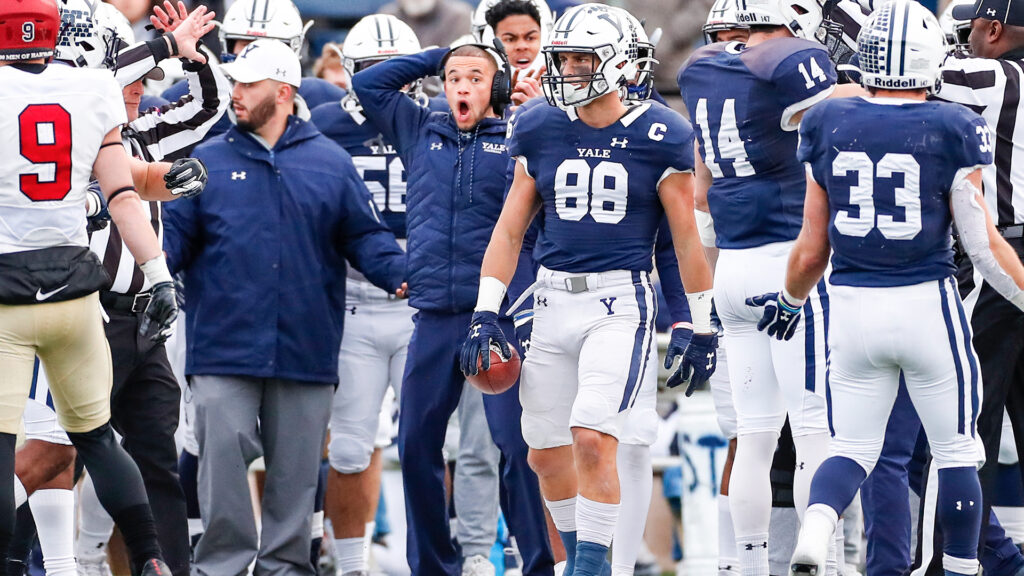Team History
The Yale Bulldogs football team boasts one of the most storied legacies in the history of college football. Its origins date back to 1872, making it one of the oldest programs in the nation. The Bulldogs were instrumental in shaping the early development of the sport, and their influence during the late 19th and early 20th centuries established them as a powerhouse of the gridiron. While the modern landscape of college football has evolved, the Yale Bulldogs remain a respected program with a tradition of excellence within the Ivy League.
The Bulldogs quickly emerged as a force to be reckoned with in the early days of formalized football. The program’s rapid rise, particularly under the guidance of Walter Camp (“Father of American Football”), cemented Yale’s status as a dominant power. Their success continued well into the 20th century, demonstrating a sustained commitment to football excellence.
Foundation and Early Years
Yale traces its football roots back to informal games played in the mid-1800s. In 1872, the university formalized its commitment by establishing a dedicated team. The Bulldogs found their footing quickly and are credited with playing in the first-ever recorded intercollegiate football game against Columbia University in 1873.
The influence of Walter Camp, a Yale player, coach, and innovator known as the “Father of American Football,” proved instrumental in this era of Yale dominance. Camp’s contributions revolutionized the game’s rules and strategies, providing the Bulldogs with a distinct tactical advantage.
Notable Early Achievements
The Yale Bulldogs ascended to national prominence with stunning speed. They secured an astonishing 27 national championships between 1874 and 1909, showcasing their absolute dominance. During this period, the Bulldogs frequently went undefeated for entire seasons, compiling an enviable win-loss record.
Their success established a benchmark for early college football. Yale’s long list of legendary players and coaches from the era, including figures like Pudge Heffelfinger and Amos Alonzo Stagg, further solidifies their place in gridiron history.
Periods of Change
With the rise in popularity of professional football and shifting rules and philosophies within the college game, Yale’s dominance inevitably began to wane. However, the Bulldogs remained a formidable opponent, adapting to new challenges. The formation of the Ivy League in 1954 ushered in an emphasis on academics and a level playing field, creating a new era of competition for Yale.
Despite no longer being a national title contender, their commitment to balancing athletic excellence with academic rigor remains unwavering. The program navigated evolving trends and styles of play, ensuring its staying power and relevance in a changing football world.
Championships and Achievements
The Yale Bulldogs’ trophy case boasts an impressive collection of titles:
National Championships: 27 (including those shared with other programs)
Ivy League Championships: 33
Although their national championship era has passed, the Bulldogs consistently contend for the Ivy League crown, proving their sustained competitive spirit. The program has produced countless All-Americans and numerous NFL players, further demonstrating the enduring quality of Yale football. The Bulldogs’ history is laden with legendary games, rivalries like the annual clash with Harvard, and moments that have left an indelible mark on college football lore.
Current Roster
The team comprises a diverse group of student-athletes hailing from across the nation. The roster features a mix of positions, including quarterbacks, running backs, wide receivers, offensive and defensive linemen, linebackers, defensive backs, and specialists. These dedicated athletes strive for both academic and athletic excellence on the playing field. They embody the modern values of Yale football: commitment, sportsmanship, and the pursuit of well-rounded achievement.
Management and Coaching Staff
The Bulldogs benefit from a skilled coaching staff led by head coach Tony Reno. Reno brings years of coaching experience across various levels of football. He and his assistants are responsible for developing player skills, game strategies, recruitment, and upholding the Yale football tradition.
Alongside the coaches, a dedicated support staff helps manage team operations, player development, and logistics. This comprehensive team of professionals ensures that the Bulldogs are well-prepared and supported in their pursuit of on-field success.
Home Stadium Information
The Yale Bulldogs play their home games at the historic Yale Bowl. Built in 1914, the Yale Bowl is one of the oldest and most iconic college football stadiums in the country. Its unique horseshoe design and massive capacity (once holding over 70,000 fans) make it a revered landmark.
The Yale Bowl underwent renovations in recent years, modernizing facilities while preserving its storied character. For Yale players and fans alike, playing in the Yale Bowl connects them to the rich history of the Bulldog football program, fostering a sense of pride and tradition.
-
*********** ***** ******* *** ***** ** ************ **** ********* *****dd.mm.yyyy 00:00 PM
-
****** *********** **** ** ***** ****** *** **** *** ******: ********* *** ******* *** ****'* ****dd.mm.yyyy 00:00 PM
-
*********-***** ********: **** 6 **** *** ***** *** * ********* **** 7dd.mm.yyyy 00:00 PM
-
**********-************ *******: ****** ****ć, ******* *******, *** * ********* ********** ********dd.mm.yyyy 00:00 PM
-
********* **** ********* ** *** ***: ********* *** ********* ** ****** ******** **. *** *** *****dd.mm.yyyy 00:00 PM
-
****************** ******* **********: *** ********' **** ****dd.mm.yyyy 00:00 PM







